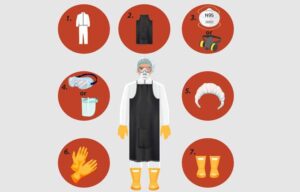
Photo: Centers for Disease Control and Prevention
Washington — Responding to an outbreak of avian flu, the Centers for Disease Control and Prevention has updated interim guidance intended to protect workers exposed to certain animals and animal products.
CDC says poultry and livestock farmers and workers, slaughterhouse workers, veterinarians, and public health responders are among the occupational groups that “may be at increased risk of exposure” to viruses associated with avian flu. The agency reports a recent case involving a dairy worker.
CDC recommends avoiding unprotected direct or close contact with sick birds, livestock and other animals; animal carcasses; raw milk; viscera and udders from lactating dairy cattle; and surfaces and water that may be contaminated with animal waste.
Tips on personal protective equipment use for workers who operate near or under those conditions include:
- Use separate designated clean areas, one for donning PPE and one for removing it.
- Avoid touching your eyes, mouth and nose after contacting any contaminated material.
- Don’t eat, drink, smoke, vape, chew gum, dip tobacco or use the bathroom while wearing PPE.
- When removing PPE, clean and disinfect boots before removing them. Wash your hands after removing coveralls and gloves, and again after removing eye and face protection and a head or hair cover.
- Shower at the end of the work shift and leave all contaminated clothing and equipment at work.
- Watch for symptoms of illness for 10 days after finishing work. Inform your supervisor and speak with a doctor if you become ill.
CDC notes that “all PPE should be used in accordance with OSHA regulations” and calls for worker training on when to use PPE; which PPE is necessary; proper fit, use, disposal and maintenance; and PPE limitations.
As of April 26, CDC said the public health risk for avian flu was low, but the agency “is watching the situation carefully and working with states to monitor people with animal exposure.”
McCraren Compliance offers many opportunities in safety training to help circumvent accidents. Please take a moment to visit our calendar of classes to see what we can do to help your safety measures from training to consulting.
Original article published by Safety+Health an NSC publication


